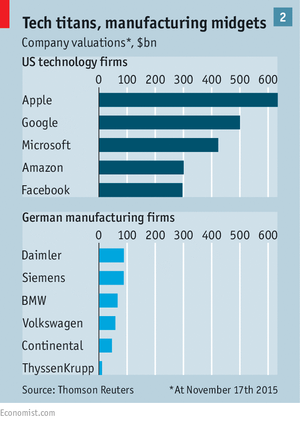The Guardian über Internetunternehmen aus Europa im internationalen Vergleich:
David Galbraith, a partner at venture investment firm Anthemis, has a statistic he likes to quote. “The combined value of the top three internet companies in the Americas – so, basically, in America – is around $0.75tn (£0.5tn). In Asia, it’s around $0.5tn. In Africa, it’s $50bn. And in Europe, it’s just $25bn.” (..)
The figure for Africa includes Naspers, the South African conglomerate which owns 35% of China’s massive net firm Tencent, for instance. And the figures only take into account “pure play” internet firms, so that Apple doesn’t count (because it makes watches, phones and computers) but Google and Facebook do.
The problem Galbraith is highlighting isn’t one of financial returns, though: it’s an issue of power. “If you look at Europe now, we’re in the equivalent stage of being in, let’s say, 1920, with no car companies. No Citröen, no BMW, no Rolls Royce, no Fiat, nothing.
“This is as big a deal as the industrial revolution. You’re moving from the agrarian to the industrial to the digital age, and you’re seeing the digitisation of everything. Industries which weren’t considered to be digital are being transformed by some of the methodologies and the processes of the digital age. Take Tesla – we think of Tesla as being a ‘startup’, but it’s the same size as Audi.” Both companies are valued at around $30bn.
For all that the technological revolution is often framed as a ground-up burst of innovation from a thousand startups, actual power is concentrated in just a few hands.
Unter dem Titel "Does Deutschland do digital?" befasste sich der Economist jüngst ebenfalls mit Deutschland und dem digitalen Wandel in jeder Wirtschaftsbranche und bietet einen guten Überblick über die aktuelle Situation:
Some fear that its carmakers, which directly or indirectly employ one in seven workers nationwide, could be demoted to low-margin metal-bashers, while American tech giants make most of the money by providing the software and the in-car entertainment—and perhaps, in time, designing the cars themselves. (..)
Bosch, Trumpf, Siemens and others claim to be open, but it is not clear how welcoming they will be in practice. German bosses tend to think that they can offer all the necessary services themselves and do not like the idea of inviting others onto their platform. (..)
The best new services are often the result of combining information from different sources. But in Germany this can be difficult. One barrier is privacy: in addition to the country’s strict data-protection laws, there is a widespread suspicion of anything that smacks of monetising data.
Am deutlichsten werden die bereits bestehenden Größenunterschiede zwischen den jungen Internetgiganten und den alten Industrieriesen in dieser Grafik:

Vor diesem Hintergrund ist auch der kommende Angriff von Apple, Google und den chinesischen Elektroautoherstellern von morgen auf den Automobilmarkt zu sehen.
Wird das wirklich auf Augenhöhe mit den deutschen etablierten Herstellern geschehen? Haben die deutschen Automobilhersteller wirklich einen Vorteil? Wenn ja, dann liegt er nicht in der wirtschaftlichen Größe, der Börsenbewertung oder der Kriegskasse.
Die Jahre der Ignoranz werden einen teuren Preis haben.
In Deutschland haben noch 2013 deutsche Innenpolitiker und führende Intellektuelle ein "deutsches Google" gefordert, während ein mulitnational europäisch finanziertes Desaster mit gleichem Ziel in den letzten Zügen lag:
“Europe’s sort of semi-open market has created the scenario where it doesn’t have any of its own platforms,” Galbraith concludes with a sigh. And where the EU tried to create its own platforms directly, “it was spectacularly bad. It tried to create its own version of Google, called Quaero. It was laughably bad.” Created with a €99m grant at the request of the French government, Quaero was eventually put to bed in December 2013. Two years into its creation, engineer Nick Tredennick wrote in IEEE Spectrum magazine that: “Going head-to-head with Google with a project involving well-funded, energetic entrepreneurs would be foolish. Attempting the same with a multigovernment collaboration is beyond description.”
Hier liegt ein großer Teil des Problems: Die deutsche und europäische (massenmedial organisierte) Öffentlichkeit ist unfähig, die Digitalisierung in Europa angemessen zu begleiten.
Ein Grund liegt zumindest in Deutschland in Strukturen und Mentalitäten, die jeder Form von Veränderung aversiv gegenüberstehen.1
Es bleibt die Frage, was junge Unternehmen wie Zalando und ältere Unternehmen wie Bosch, die eine vielversprechende Zukunft haben, tun können, um nicht mit hinuntergezogen zu werden.
- Da die Disruptionstheorie letztlich eine Wertschöpfungsnetzwerktheorie ist, ist eine spannende Forschungsfrage, ob letztlich nicht nur einzelne Unternehmen sondern auch ganze Wirtschaftsregionen (Nationen etwa) eine Disruption erfahren können. Die vergleichbaren Prozesse legen ein 'ja' nahe. ↩

